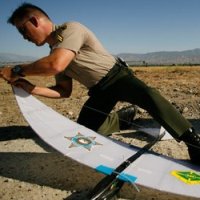Privacy Concerns Debated as FAA Lays Out Rules for Domestic Drone Operations
 L.A. County Sheriff's Officer prepares a drone (photo: Damian Dovarganes, AP)
L.A. County Sheriff's Officer prepares a drone (photo: Damian Dovarganes, AP)
The federal government has unveiled new rules governing the use of drones in U.S. airspace, sparking debate over how the technology can be employed without compromising Americans’ privacy.
The new regulations unveiled by the Federal Aviation Administration (FAA) were produced so that Washington can move forward with testing drones at six sites across the country, with the aim of integrating them into the National Airspace System.
The testing sites will be operated by private contractors still to be determined. Whichever companies are selected, they will have to meet privacy requirements formulated by the FAA.
The agency’s move came under criticism from the American Civil Liberties Union (ACLU), which said the privacy rules were too short on specifics.
“It’s crucial that as we move forward with drone use, those procedural protections are followed by concrete restrictions on how data from drones can be used and how long it can be stored,” ACLU’s legislative counsel, Christopher Calabrese, said in a prepared statement. “Congress must also weigh in on areas outside of the FAA’s authority, such as use by law enforcement and the Department of Homeland Security, which have the ability to use drones for invasive surveillance that must be kept in check.”
Another critic, Representative Ed Markey (D-Massachusetts), accused the FAA of disregarding “the need for strong and comprehensive privacy safeguards,” and called instead for “federal legislation to protect innocent individuals from expanded use of commercial and government drones.”
But Ryan Calo, who writes about emerging technology for Forbes, defended the FAA, saying its rules demonstrate officials are “taking privacy seriously and following a relatively defensible path forward.”
“The agency is requiring, for starters, that its test sites develop privacy plans,” Calo added. “The privacy plan has to explain how data that is collected will be used and what the site’s policy is around retention. The site must make these plans publicly available, create a mechanism for receiving and addressing public comment, conduct annual reviews, and have a way to update and enforce the plan.”
-Noel Brinkerhoff
To Learn More:
FAA Issues Privacy Rules for Drone Sites (by Philip A. Janquart, Courthouse News Service)
Drone Crash Raises Questions of Public Safety, Privacy (The Oswegonian)
The FAA's Drone Privacy Plan: Actually Pretty Sensible (by Ryan Calo, Forbes)
Unmanned Aircraft System Test Site Program (Federal Aviation Administration)
Federal Government Clashes with Commercial Drone Industry (by Matt Bewig, AllGov)
Homeland Security Requests Lid on Drone Data after Internal Documents Reveal 500 U.S. Flights (by Noel Brinkerhoff and Danny Biederman, AllGov)
Audit Reveals that FBI Has Been Flying Drones in U.S. since 2006 (by Noel Brinkerhoff, AllGov)
- Top Stories
- Unusual News
- Where is the Money Going?
- Controversies
- U.S. and the World
- Appointments and Resignations
- Latest News
- Trump Renames National Football League National Trump League
- Trump to Stop Deportations If…
- Trump Denounces World Series
- What If China Invaded the United States?
- Donald Trump Has a Mental Health Problem and It Has a Name






Comments